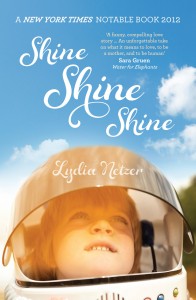 Published by Simon & Schuster 13 June 2013
Published by Simon & Schuster 13 June 2013
408pp, paperback, £7.99
Shortlisted for the LA Times Book Prize for Fiction 2012 and selected as a New York Times Notable Book, Lydia Netzer’s first novel was published to a storm of favourable criticism and comparisons with Yann Martel, Mary Gaitskell, Anne Tyler and Don DeLillo.
In an article written specially for bookoxygen, Lydia Netzer reveals some of her inspiration for the book.
Why Burma? Why Bald? Why Bubber?
As a reader myself, I often wonder about the choices authors make. Did a writer agonize over a certain element of the novel for months or years, toiling and sweating to narrow down the possibilities? Did she just sit up from a dead sleep at 3am, panting and frothing, having come to a sudden, inspired decision? Did she crib a plot point off an obscure adventure novel she’s sure no one has ever read? What? No one ever does that? Oh, me neither.
I thought I’d give a little insight into three of the choices I made in my novel: Why my main character was born in Burma, why she was as bald as an egg, and why she named her son Bubber.
Burma came about very scientifically — no inspiration whatsoever was involved. I knew that I wanted Sunny to be born in the midst of a solar eclipse, because I had this image in my mind of the way the solar flares appear around the moon as flowing hair. I like the word ‘umbra’ and I liked the idea that this bald character whose husband would someday travel to the moon would be born in the moon’s shadow, with the sun flowing around it as hair.
I knew that I wanted her to be 30-ish when the book was released, so I settled on 1981 as a birth year for her. Then it was just a matter of finding out where the moon shadows would have fallen that year. As it turned out, two solar eclipses were visible in 1981 — one in the very southern South Pacific and one in what was then Burma, now Myanmar. I considered for about five minutes putting Sunny’s mother and father on a remote island south of French Polynesia, but when I began to consider what was going on in Burma in 1981, the plot possibilities started firing off in my head, and the decision was made.
As a result of this decision to put Sunny’s birth in Burma, the father became a missionary working in Burma during a time when missionaries were being thrown out by the communist government. The mother became an unhappy missionary’s wife. And the solution to another problem — how to get them back from Burma to the United States so Sunny could meet Maxon — arose from that relationship and the political conflict in the region.
Making Sunny bald was a bit of inspiration, for which I’m most grateful. I wanted her to have a physical abnormality that would represent the oddness and insufficiency that all women feel when they contemplate becoming mothers. We all worry we’re too weird, damaged, not good enough in some way, to be responsible for the life of another human being. So I wanted Sunny to have a visual manifestation of that deep doubt that’s universal. But it also had to be something she could feel sort of proud and feisty about when she was growing up, only finding it embarrassing when she was trying to fit in with the other moms. And it needed to be something that her husband Maxon, a big fan of symmetry and mathematical perfection, would find attractive.
The idea of baldness hit me like a ton of bricks when I thought of it. It was something that Sunny could completely mask, in order to appear to be perfect. It was something that Maxon the mathematician would admire — as a matter of fact he found her baldness preferable to her having hair, which is never quite symmetrical and anyway is an evolutionary leftover that has no purpose. It was something that would make people stare, make them feel awkward, make them have lots of questions, but also something that Sunny could unmask and still be absolutely beautiful, otherworldly, radiant. So that’s how the baldness came to be.
As for Bubber, his name is an homage to Carson McCullers and her character Bubber Kelly in The Heart is a Lonely Hunter. Bubber Kelly was one of the most interesting characters in that wonderful novel, to me — the way he yells, how smart he is, and yet his helplessness in the face of circumstances. I wonder what this strange kid, Bubber Kelly would have been like, had he been born in contemporary times, in suburban privilege. Would he have been on Ritalin? Would he have been recognized as a genius? Naming Sunny’s son Bubber was my way of asking myself these questions.
I guess if my experience is any indication, there is a bit of science, a bit of luck, and some external reference involved in gathering ideas for a book. When you can get all these elements working together, that’s a little bit of magic that we authors are all looking for — through months of toil, middle-of-the-night breakthroughs, and everything in between.
